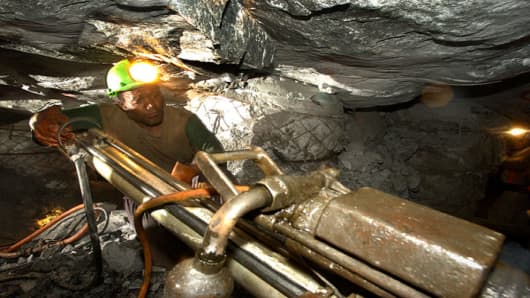Conflict in the West African state of Mali -- the continent's third-largest gold producer -- poses "manageable" risks for miners active in the country's south as Al Qaeda-linked Islamist rebels remain confined to strongholds in the north while former colonial power France continues its offensive against militant bases, global risk consultancy Eurasia Group said Monday.
France, which has poured hundreds of troops into the Malian capital Bamako in recent days, carried out more air strikes on Monday in the vast desert area seized last year by an Islamist alliance grouping Al Qaeda's North African wing AQIM alongside Mali's home-grown MUJWA and Ansar Dine militant groups.
(Read More: Conflict Minerals in Your Mobile—Why Congo's War Matters)
"With France's robust intervention, which will include hundreds of troops for Bamako, and the forthcoming ECOWAS (Economic Community Of West African States) deployment likely to be concentrated at the de facto border areas and in the south, it is highly unlikely that the recent Islamist incursion southwards will either take the capital or threaten still-remote gold fields," wrote Philippe de Pontet, Africa Director at the Eurasia Group in the report.
Though risks to gold producers like LSE and Nasdaq-listed Randgold Resources - which operates three mines in Mali and is the country's largest investor -- "are likely to remain manageable," de Pontet warned foreign mining companies may be targeted if militant groups retaliate in the aftermath of the French operations.
"As militants seek reprisals on intervention supporters and Westerners more broadly, though, kidnapping and other security risks could rise for miners and other foreign-owned businesses that could make attractive targets," he said.
Should France and its allies get mired in a drawn-out war in Mali, the country's deposits of gold- relatively isolated, for now at least, in the south - could inevitably become 'conflict minerals' with both the government and rebels exploiting low-paid often underage workers to extract ores at artisanal, or small-scale subsistence mines, using the proceeds to prolong armed conflict.
(Read More: What Are Gold Bugs Afraid Of?)
Evidence suggests these conditions are already standard practice in some parts of the country. In a 108-page report, "A Poisonous Mix: Child Labor, Mercury, and Artisanal Gold Mining in Mali," released in December 2011, Human Rights Watch said at least 20,000 children work in Malian artisanal gold mines under extremely harsh and dangerous conditions.
Figures obtained by Human Rights Watch from the Malian Ministry of Mines put the amount of artisanally-mined gold exported per year at around four metric tons, worth around $218 million at November 2011 prices.
Dominated by Gold
"Mali's mineral sector was dominated by the production of gold," wrote Yadira Soto-Viruet in the U.S. Geological Survey's 2010 overview of Mali's mineral resources. "No other mineral commodities were produced in significant quantities in the country, with the exception of rock salt and semiprecious stones."
Despite efforts to contain them, rebels launched a counteroffensive in Mali on Monday, seizing the central town of Diabaly and promising to drag France into a brutal Afghanistan-style war. "France has opened the gates of hell for all the French," said Oumar Ould Hamaha, a spokesman for MUJWA, which has imposed strict sharia, Islamic law, in its northern fiefdom of Gao. "She has fallen into a trap which is much more dangerous than Iraq, Afghanistan or Somalia," he told Europe 1 radio.
(Slideshow: The World's Biggest Gold Mines)
The United States, which has operated a counter-terrorism training program in the region, said it was sharing information with French forces and considering providing logistics, surveillance and airlift capability.
"We have a responsibility to go after al Qaeda wherever they are," Defense Secretary Leon Panetta told reporters heading with him on a week-long tour of European capitals.
Despite fears of escalation, Randgold Resources says it's "business as usual" at its Mali projects. It confirmed in a statement on January 14 that operations were normal at its Loulo-Gounkoto gold mining complex and its Morilla joint venture following the declaration of a state of emergency in Mali over the weekend as the joint French-Malian military operation against the rebels intensified in the north.
Morila, a joint venture with Africa's largest gold producer, AngloGold Ashanti, is 280 kilometers (170 miles) southeast of Bamako, and Loulo lies in the west of Mali, bordering Senegal, 350 kilometers west of Bamako. Besides Morila, AngloGold is a joint venture partner with Canadian gold producer IAMGold in two other mines in Mali - Sadiola and Yatela. The Malian government holds up to 20 percent in all of these mines.
"The Randgold operations are in safe areas some 700 kilometres distant from conflict zones and have not been affected by any of the issues that have afflicted Mali over the last ten months, including the recent attacks by rebels in the north of the country," the company said in a statement on its website.
Nonetheless, Chief Executive Mark Bristow said the company was monitoring the situation closely and had put contingency plans in place.
"Should the current military build-up impact on logistics, both operations are well-stocked with fuel and other consumables."


